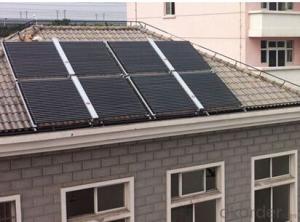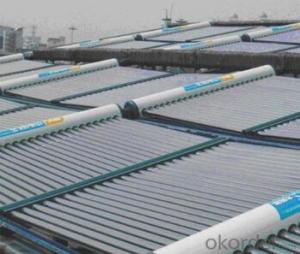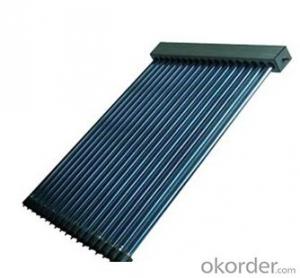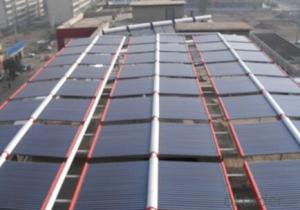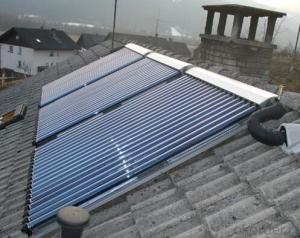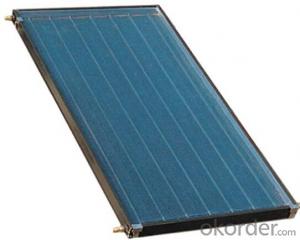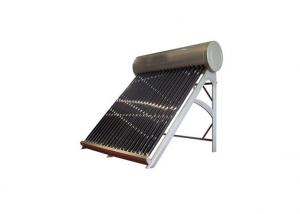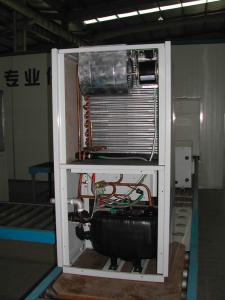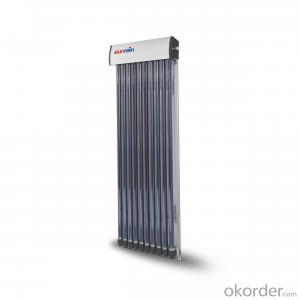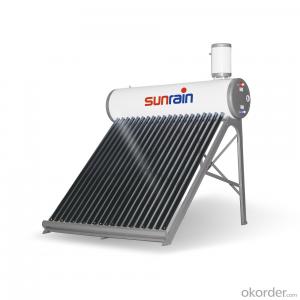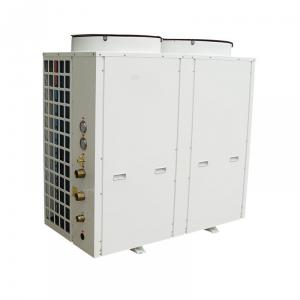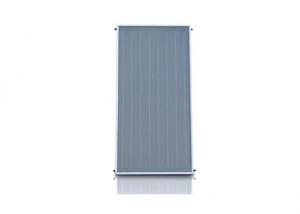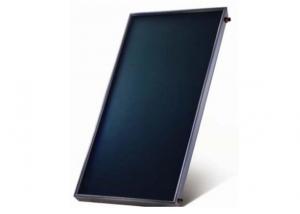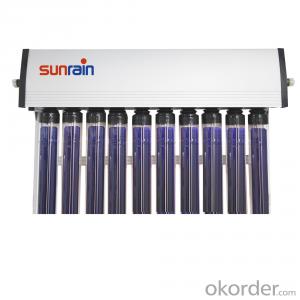Solar Collector 2016 Top Level (Double Coiler 300Liter)
- Loading Port:
- China main port
- Payment Terms:
- TT OR LC
- Min Order Qty:
- 10 set
- Supply Capability:
- 10000 set/month
OKorder Service Pledge
OKorder Financial Service
You Might Also Like
Solar water heaters features
1. The upright tank can make the water temperature to a high level. It can hot the water instantly
2. The tank inside the building, the hot water loses less energy than the normal one
3. The solar collector and the tank of solar water heater is separated, that makes the system combine with the building perfectly, which will reduce the sightseeing for the building and environment around
4. Back up with electric heater so that in the day without sunshine hot water can also be used
5. Can be combined with gas or electric heater
6. Max. Pressure: 12bar; Operating Pressure: 6 bar
7. It can be used for other function, such as warming
Solar water heaters working principle
1. The solar collector absorbs solar energy and transmits it to the solar water heater tank through circulation
2. When the temperature of the collector reaches the set value, the controller starts the circulation pump automatically
3. The circulation pump makes heat-conducting liquid circulate automatically
4. The heat-conducting liquid transfers heat to water by lower heat exchanger in the water tank.
5. When the temperature difference between solar collector and heat pipe solar water heaters tank doesn't reach the set value, the circulation pump will be shut automatically
6. In case the temperature of the water tank does not reach Tmax, Electric Heating Element will start to work automatically
Solar water heaters working station component:
1. Operating screen
2. Manometer
3. Pump speed adjust switches
4. Temperature difference circulation pump
5. Flow rate indicator
6. Return circuit connector
7. Safety valve
8. Expansion vessel connector9. Return circuit connector
10. Wall mounting
11. Expansion vessel:8L
12. Pressure resistance: 10 bar pressure for expansion vessel
Solar water heaters specification:
Description | solar water heaters |
Material of out manifold | 0.55mm thickness color steel/ fluorine carbon steel |
Material of inner tank | Food grade 2.0 mm thickness SUS304 stainless steel |
Tank insulating layer | 40mm 45kg/m³ high-density polyurethane foamed |
Inlet and outlet hole | Male G1'' |
Max pressure | 0.6 Mpa |
Solar collector tube | 3.3 Borosilicate glass with N/Al coating |
Thickness of glass tube | 1.6mm |
Vacuum tube tightness | P≤0.005 Pa |
Absorption | as=0.93-0.96 (AM1.5) |
Emission ratio | εh=0.04-0.06 (80C±5C) |
Idle sunning property parameters | Y=220~260m2.C/KW |
Average heat loss coefficient | ULT=0.6~0.7W/(m2.C) |
Bracket: | 2.0mm thickness aluminum alloy |
Tank weight | 75KGS |
Tank size | 560mm Dia x 1810mm Height |
Tank capacity | 300L |
Solar collector | 2pcs 58x1800x15tube solar collector |
Absorber area | 2.811 m² |
Working station | SP116 working station |
Heat exchanger length | Upper:12m, Underside:18m |
Solar water heaters details show:
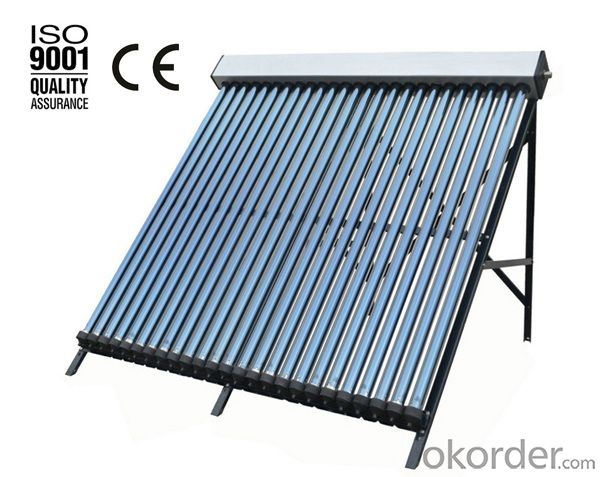
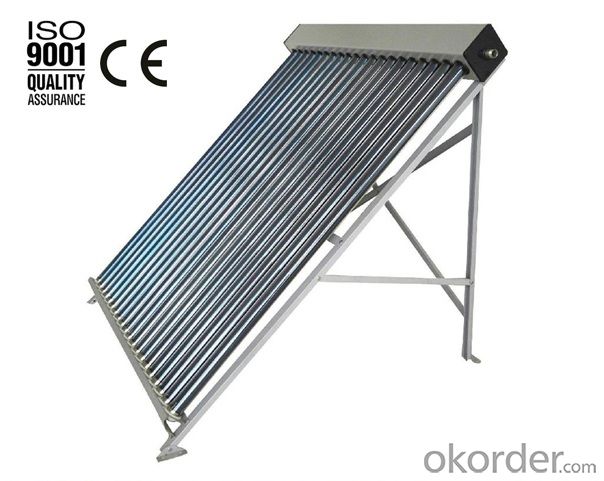
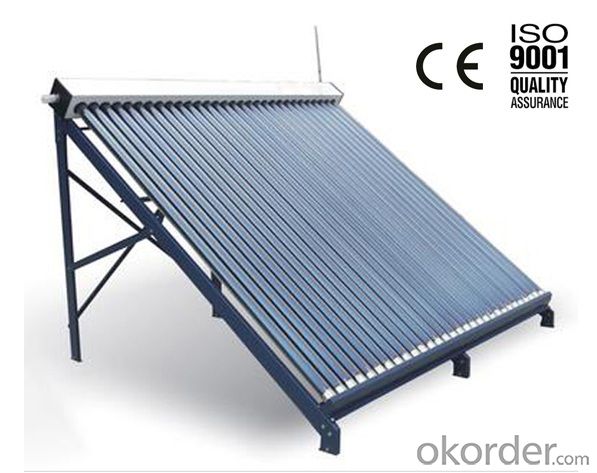
Benefits of this kind of solar water heaters:
1. Prolong the life of your existing water heater
2.Costs less than an electric, gas or oil water heater
3.No maintenance required
4.Lasts longer than a traditional hot water heater
5.Reduce your water heating costs
- Q:Can a solar water heater be used in areas with limited access to energy management practices?
- Yes, a solar water heater can be used in areas with limited access to energy management practices. Solar water heaters do not require electricity to operate as they rely on the sun's energy to heat the water. Therefore, even in areas with limited access to energy management practices or unreliable power supply, solar water heaters can still effectively provide hot water for various purposes.
- Q:Can a solar water heater be used in areas with limited access to local suppliers or distributors of solar equipment?
- Yes, a solar water heater can be used in areas with limited access to local suppliers or distributors of solar equipment. Solar water heaters are relatively simple systems that can be constructed using readily available materials and basic plumbing skills. In fact, many DIY (do-it-yourself) guides and tutorials are available online for building homemade solar water heaters. Additionally, there are organizations and non-profit groups that promote the use of solar energy in developing regions or remote areas. These organizations often provide assistance, training, and resources for individuals or communities to build their own solar water heaters. They may also offer guidance on maintenance and troubleshooting. Furthermore, some companies specialize in manufacturing and distributing solar water heaters specifically designed for off-grid or remote locations. These systems are often designed to be durable and low-maintenance, making them suitable for areas with limited access to spare parts or technical support. Overall, while limited access to local suppliers or distributors of solar equipment may pose some challenges, it is still possible to utilize solar water heaters in such areas through DIY construction, assistance from organizations, or specialized products designed for off-grid settings.
- Q:What are the safety considerations with a solar water heater?
- When contemplating the safety aspects of a solar water heater, one must bear in mind several crucial factors. To start, it is imperative to have a qualified professional, well-versed in the specific requirements and regulations associated with solar water heaters, handle the installation. This ensures correct installation and adherence to safety protocols. One important safety consideration is the possibility of overheating. Solar water heaters are designed to capture and store heat from the sun, but improper control can lead to excessively high temperatures. To mitigate this risk, most solar water heaters are equipped with temperature and pressure relief valves that release excess heat and pressure automatically if necessary. Regular inspection and maintenance of the system are also crucial to ensure proper functioning. This involves checking for leaks, adequate insulation, and ensuring the system is free from debris or vegetation. Any signs of damage or malfunction should be promptly addressed to prevent safety hazards. Another safety consideration is the use of appropriate materials and components. The system should be constructed with durable and weather-resistant materials to withstand the elements and prevent corrosion. High-quality insulation materials are also essential to minimize heat loss and prevent accidental burns. Furthermore, electrical safety is a significant concern with solar water heaters. Proper grounding and wiring techniques must be employed to prevent electrical shocks or fires. In some cases, electrical components may need to be disconnected during maintenance or repairs to ensure safety. Lastly, one must be aware of the potential for freezing in colder climates. If the solar water heater is not designed to handle freezing temperatures, precautions must be taken to prevent pipe bursts and damage to the system. This may involve using antifreeze or draining the system during winter months. Overall, safety considerations for a solar water heater involve proper installation, regular maintenance, temperature and pressure monitoring, use of appropriate materials, electrical safety, and protection against freezing. By adhering to these safety guidelines, the risk of accidents or malfunctions can be minimized, allowing for the safe and efficient operation of the solar water heating system.
- Q:Do solar water heaters need electricity?
- Working principleThe sun through the first layer of glass heat pipe according to black heat absorbing layer second layers of glass, solar energy heat absorption, because between two layers of glass is vacuum insulated, the heat transfer will be greatly reduced (heat radiation still exists, but there is no thermal conduction and convection), most of the heat is only transmitted to the glass tube the water inside the glass tube, heating water, heating water and light along the glass tube heating surface to enter the insulation water storage barrel, the barrel temperature is relatively low water along the glass tube into the back surface of glass tube, this constant cycle, the preservation of the water in the water bucket so as to achieve the continuous heating, hot water the purpose of.
- Q:What is the impact of snow or ice on the performance of a solar water heater?
- The performance of a solar water heater can be greatly affected by snow or ice. When the surface of the solar panels is covered by snow or ice, sunlight cannot reach the panels, resulting in a decrease in their ability to convert solar energy into heat. This leads to a decrease in the overall efficiency and performance of the solar water heater. Additionally, snow or ice can block the flow of water through the system. If the water in the pipes or heat exchange fluid freezes, it can cause damage to the system or even shut it down completely. This can result in a loss of hot water supply and reduced functionality of the solar water heater during winter months. To minimize the impact of snow or ice on solar water heaters, several measures can be taken. One commonly used method is to install the solar panels at an angle or tilt, allowing snow or ice to slide off more easily. Moreover, installing a heating element or anti-freeze solution in the pipes or heat exchange fluid can prevent freezing and maintain the system's functionality. Regular maintenance and cleaning of the solar panels are also crucial to ensure optimal performance. Removing snow or ice buildup from the panels and ensuring proper insulation and protection against freezing temperatures are essential steps to minimize the impact of winter weather on the performance of a solar water heater. In summary, snow or ice can significantly reduce the efficiency and performance of a solar water heater. By taking preventive measures such as proper installation, insulation, and regular maintenance, the impact can be minimized, and the system can operate effectively year-round.
- Q:Can a solar water heater be used in areas with limited access to financing options?
- Yes, a solar water heater can be used in areas with limited access to financing options. Solar water heaters are generally affordable and have low maintenance costs. Additionally, there are various financing options available for renewable energy projects, such as government subsidies, grants, and community-based initiatives, which can help make solar water heaters more accessible in areas with limited financial resources.
- Q:Can a solar water heater be integrated with other renewable energy systems?
- Certainly! A solar water heater has the potential to be combined with various other renewable energy systems. This integration offers a comprehensive and efficient method of addressing the energy requirements of a building or household. For instance, by linking a solar water heater to a solar photovoltaic (PV) system, the generated electricity can be used to power the water heater's pump or auxiliary systems. Consequently, any excess electricity produced by the PV system can be employed to heat water, thereby reducing the reliance on conventional grid electricity. Moreover, a solar water heater can also be integrated with other renewable energy sources like wind or geothermal. In regions abundant with wind energy, it is possible to connect a wind turbine to the same grid as the solar water heater. This allows for the utilization of wind power to supplement solar energy in heating water. Similarly, in areas with access to geothermal resources, a geothermal heat pump can be used in conjunction with the solar water heater to provide efficient heating and cooling for the water. The integration of diverse renewable energy systems provides a sustainable and resilient energy solution. By harnessing multiple sources of renewable energy, the overall energy generation and consumption can be optimized, thereby reducing dependence on fossil fuels and minimizing environmental impact. Additionally, the combination of different renewable energy technologies ensures a more reliable and consistent energy supply, as the availability of one resource can compensate for the variability of another. In conclusion, integrating a solar water heater with other renewable energy systems is a viable and advantageous approach to maximizing energy efficiency and sustainability. This approach allows for the utilization of multiple renewable resources, reduces reliance on traditional energy sources, and contributes to a greener and more resilient energy future.
- Q:Solar water heater after a month without water, will be bad
- No, as long as the solar water heater vacuum tube and water tank, the stent is not bad to work properly! Just note that when used again, if the water in the water, remember the sun when the water, because this will cause the explosion of the vacuum tube!For more products and information please Baidu Jiang Yue Mall for viewing, the most complete solar energy air machine, accessories and so onRecommendation: "Dr. Sun" in the solar energy, solar (without water level sensor and solenoid valve), rainy weather heating and hot water utilization rate is fast, and the customer service rate is greatly reduced, which saves time and energy saving. This type of solar energy than ordinary single warehouse in the absence of the sun heating time is only 20-30 minutes, and a single warehouse needs 2-3 hours!
- Q:Can a solar water heater be used in areas with high levels of water salinity?
- Yes, a solar water heater can be used in areas with high levels of water salinity. However, it is important to consider the potential negative impact of saltwater on the system's components. The high salt content may cause corrosion and decrease the efficiency of the solar water heater over time. Regular maintenance and appropriate materials can help mitigate these issues and ensure the proper functioning of the system in such areas.
- Q:Can a solar water heater be used in areas with water restrictions?
- Yes, a solar water heater can be used in areas with water restrictions. Solar water heaters use the sun's energy to heat water, eliminating the need for excessive water consumption. They are a sustainable and environmentally friendly option for heating water, making them suitable for areas with water scarcity or restrictions.
1. Manufacturer Overview |
|
|---|---|
| Location | |
| Year Established | |
| Annual Output Value | |
| Main Markets | |
| Company Certifications | |
2. Manufacturer Certificates |
|
|---|---|
| a) Certification Name | |
| Range | |
| Reference | |
| Validity Period | |
3. Manufacturer Capability |
|
|---|---|
| a)Trade Capacity | |
| Nearest Port | |
| Export Percentage | |
| No.of Employees in Trade Department | |
| Language Spoken: | |
| b)Factory Information | |
| Factory Size: | |
| No. of Production Lines | |
| Contract Manufacturing | |
| Product Price Range | |
Send your message to us
Solar Collector 2016 Top Level (Double Coiler 300Liter)
- Loading Port:
- China main port
- Payment Terms:
- TT OR LC
- Min Order Qty:
- 10 set
- Supply Capability:
- 10000 set/month
OKorder Service Pledge
OKorder Financial Service
Similar products
New products
Hot products
Related keywords
